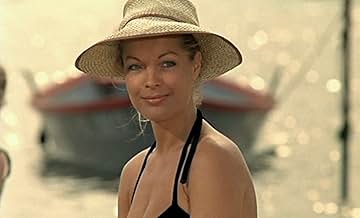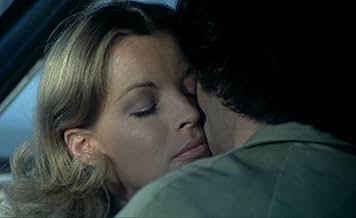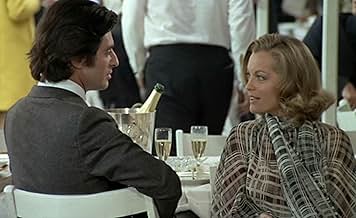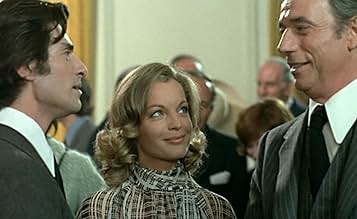IMDb RATING
7.3/10
4.1K
YOUR RATING
Cesar is in love with Rosalie. But Rosalie isn't making it easy for him, especially when her old flame enters the picture.Cesar is in love with Rosalie. But Rosalie isn't making it easy for him, especially when her old flame enters the picture.Cesar is in love with Rosalie. But Rosalie isn't making it easy for him, especially when her old flame enters the picture.
- Director
- Writers
- Stars
- Awards
- 1 win total
Eva Maria Meineke
- Lucie Artigues
- (as Eva-Maria Meineke)
Pippo Merisi
- Albert
- (as Pipo Merisi)
- Director
- Writers
- All cast & crew
- Production, box office & more at IMDbPro
Featured reviews
'Cesar et Rosalie', the title of the 1972 movie by French film director Claude Sautet, can easily be misleading. It is not a simple love story, or rather it is not a single love story, but two. In other words, it is the story of a love triangle, in which a woman is loved by two men, and returns love to both of them. The situation seems awkward and could be the subject of a passional film about jealousy with the potential to end tragically, or it could be a pretext for a wild comedy. I confess that I know very little about Claude Sautet, the film's director and co-writer. If my memory serves me well, this is his first film I've ever seen. His merit here is to have written a sensitive and intelligent story and to have chosen and led a formidable team of actors with the help of which he made a film that withstands the test of the almost half century that passed from production.
Rosalie (Romy Schneider) is newly divorced taking care of her little daughter. Cesar (Yves Montand), her boyfriend, is much older than her, but he is rich, charismatic, and full of self-confidence, at least until the appearance of David (Sami Frey), Rosalie's first love from the time just before her marriage. The two men love Rosalie, each of them in his own way, very different from each other. Rosalie hesitates as she cannot decide between the younger man who has left abandoned her years before and the older man who ensures her safety and who seems willing and able to do anything for her. Where will the romantic competition between the two lead? What will Rosalie decide? I will say, of course, nothing about the ending except that it is one of the few cases in which I do not agree with my favourite film critic, the late Roger Ebert, who criticised it quite severely. I really liked the open and surprising final. Today's feminists may be irritated for much of the film, but they will be rewarded in the end. In fact, a new movie could start here.
Yves Montand and Romy Schneider are fascinating, and it's hard to believe that it's been almost 50 years since this film was made and 3-4 decades since they've left this world. Sami Frey completes this triangle that draws the kind of plot that was very fashionable during the French New Wave, but which is described here with the methods of classic French cinema based largely on text and the charm and talent of the actors. Claude Sautet knew how to direct his actors and leave them enough freedom to get the best of them. The cinematography, the music, the natural and urban scenery are no more than effective, serving the plot. An interesting extra detail, proof of Sautet's casting talent, is the appearance of a 19-year-old red-haired actress named Isabelle Huppert in a supporting role, one enough well defined and with enough presence on screen so that we can remember it - probably the first more consistent role of the future star in a feature movie. 'Cesar et Rosalie' is a beautiful and interesting film, which has withstood the test of time and is still worth watching or re-watching today.
Rosalie (Romy Schneider) is newly divorced taking care of her little daughter. Cesar (Yves Montand), her boyfriend, is much older than her, but he is rich, charismatic, and full of self-confidence, at least until the appearance of David (Sami Frey), Rosalie's first love from the time just before her marriage. The two men love Rosalie, each of them in his own way, very different from each other. Rosalie hesitates as she cannot decide between the younger man who has left abandoned her years before and the older man who ensures her safety and who seems willing and able to do anything for her. Where will the romantic competition between the two lead? What will Rosalie decide? I will say, of course, nothing about the ending except that it is one of the few cases in which I do not agree with my favourite film critic, the late Roger Ebert, who criticised it quite severely. I really liked the open and surprising final. Today's feminists may be irritated for much of the film, but they will be rewarded in the end. In fact, a new movie could start here.
Yves Montand and Romy Schneider are fascinating, and it's hard to believe that it's been almost 50 years since this film was made and 3-4 decades since they've left this world. Sami Frey completes this triangle that draws the kind of plot that was very fashionable during the French New Wave, but which is described here with the methods of classic French cinema based largely on text and the charm and talent of the actors. Claude Sautet knew how to direct his actors and leave them enough freedom to get the best of them. The cinematography, the music, the natural and urban scenery are no more than effective, serving the plot. An interesting extra detail, proof of Sautet's casting talent, is the appearance of a 19-year-old red-haired actress named Isabelle Huppert in a supporting role, one enough well defined and with enough presence on screen so that we can remember it - probably the first more consistent role of the future star in a feature movie. 'Cesar et Rosalie' is a beautiful and interesting film, which has withstood the test of time and is still worth watching or re-watching today.
Yet another object lesson in how to do relationships. Why is it the French find it so effortless to explore the Human Condition As Entertainment. Why is it they can deal so facilely with pain and heartbreak and still make us smile. Okay, it helps if you have a great leading man, a beautiful leading lady, plus a great writer and a great director but that's still not quite enough and what you really need is something in the water. Jean-Loup Dabadie is still under-appreciated as the multi-talent he is. He thinks nothing of adapting Foreign plays into French (Bill Gibson's 'Two For The See-Saw' became 'Deux pour la balancoir' at Dabadie's hand and was a great hit at the Theatre Montparnasse three or four seasons ago) turning out screenplays like this one and even writing lyrics (he wrote 'Valentin' for Montand's son and in so doing gave Montand a late hit). Here he contributes a virtually perfect screenplay on our old friend the Eternal Triangle theme. This film is so perfect that you get the feeling that on the first day of shooting the Good Fairy turned up on the set and waved her Magic wand blessing the entire project. Love, Desire, Pain, Laughter, if you don't get enough of those at home pull up a chair, slip in the DVD/video and sup your fill. You won't regret a moment of it.
I was amazed from this film! Not only because I usually like Yves Montand and Romy Schneider, but because above all this is a film about human feelings and reactions.
Claude Sautet's works are not intellectual movies, but they have the quality of showing people in real life, with their strength and their weakness, we can find people who laugh and cry. They are films about life, there isn't necessarily an happy ending. (In Hollywood they're not able to talk to us about REAL persons.) Simple, isn't it? A director normally shows life, you may say. But in reality I don't think it's so easy. The risk is to talk about people with exaggerations and melodramatic elements. In movies like "César et Rosalie" we find common situations, people with whom we can identify and share feelings.
Here we have a woman who can't choose between two men... (Ingmar Bergman has another approach, in choosing psychological and darker aspects of people. It's another valid method.) I chose to comment this film because it's an example of intimate cinema, a way of telling stories which talk to hearts.
Claude Sautet's works are not intellectual movies, but they have the quality of showing people in real life, with their strength and their weakness, we can find people who laugh and cry. They are films about life, there isn't necessarily an happy ending. (In Hollywood they're not able to talk to us about REAL persons.) Simple, isn't it? A director normally shows life, you may say. But in reality I don't think it's so easy. The risk is to talk about people with exaggerations and melodramatic elements. In movies like "César et Rosalie" we find common situations, people with whom we can identify and share feelings.
Here we have a woman who can't choose between two men... (Ingmar Bergman has another approach, in choosing psychological and darker aspects of people. It's another valid method.) I chose to comment this film because it's an example of intimate cinema, a way of telling stories which talk to hearts.
"Cesar et Rosalie" is about a love triangle between Rosalie (Romy Schneider), Cesar (Yves Montand) and David (Sami Frey). Claude Sautet would revisit the theme of a love triangle in his later film "Un coeur en hiver" (1992). In this review I will compare these two films.
Lets start with a comparison of the two men. In "Un coeur en hiver" the difference was introvert versus extrovert. We see the same difference in "Cesare et Rosalie", Cesar being the extravert one and David the introvert. This distinction is in "Cesar et Rosalie" however of secondary importance. More important is that Cesar is the businessman and David is the creative artist. If the link between the two distinctions is logical is for everyone to decide. I would rather expect that the creative one would also be extravert and the other way round.
The role of the woman is very different between the two films. In "Un coeur en hiver" Camille (Emmanuelle Beart) has a clear preference for one of the men. In "Cesar et Rosalie" Rosalie cannot choose. She likes / loves both of them. Her perfect lover would be the combination of Cesar and David.
The most surprising element of the film is the effect the behaviour of the woman has on the realtionship between the men. In "Un coeur en hiver" the love triangle creates tension between the two friends. Also in "Cesar et Rosalie" the two men (and especially Cesar) see the other one initially as an opponent. When they realise that Rosalie is never gonna choose between them a friendship gradually emerses.
"Cesar et Rosalie" is extremely well acted, at least by Yves Montand and Romy Schneider. Sami Frey remains somewhat behind. His introverted character maybe difficult to play, but in some scenes David seemed a fassion doll to me.
In love Rosalie is a very independent woman. When it comes to housekeeping however we see how much the genderroles have changed since the 70's. When Cesar and his friends are having a poker evening Rosalie becomes the waitress and when David and his colleagues are working Rosalie becomes the coffee lady. In both instances without a sign of protest.
Lets start with a comparison of the two men. In "Un coeur en hiver" the difference was introvert versus extrovert. We see the same difference in "Cesare et Rosalie", Cesar being the extravert one and David the introvert. This distinction is in "Cesar et Rosalie" however of secondary importance. More important is that Cesar is the businessman and David is the creative artist. If the link between the two distinctions is logical is for everyone to decide. I would rather expect that the creative one would also be extravert and the other way round.
The role of the woman is very different between the two films. In "Un coeur en hiver" Camille (Emmanuelle Beart) has a clear preference for one of the men. In "Cesar et Rosalie" Rosalie cannot choose. She likes / loves both of them. Her perfect lover would be the combination of Cesar and David.
The most surprising element of the film is the effect the behaviour of the woman has on the realtionship between the men. In "Un coeur en hiver" the love triangle creates tension between the two friends. Also in "Cesar et Rosalie" the two men (and especially Cesar) see the other one initially as an opponent. When they realise that Rosalie is never gonna choose between them a friendship gradually emerses.
"Cesar et Rosalie" is extremely well acted, at least by Yves Montand and Romy Schneider. Sami Frey remains somewhat behind. His introverted character maybe difficult to play, but in some scenes David seemed a fassion doll to me.
In love Rosalie is a very independent woman. When it comes to housekeeping however we see how much the genderroles have changed since the 70's. When Cesar and his friends are having a poker evening Rosalie becomes the waitress and when David and his colleagues are working Rosalie becomes the coffee lady. In both instances without a sign of protest.
After the 25th anniversary of Romy Schneider's death, I decided to see this film once again after a number of years. CESAR E ROSALIE is Romy Schneider's third movie she made with her favorite director during her French career, the one who, unlike some others, knew her as a brilliant actress and as a gentle person, Claude Sautet. And what were my impressions after the latest view: I was enchanted. I liked this film and, strangely, in spite of the light content it offers, it's rather a profound film.
From the very beginning, there are three aspects that draw one's attention: unforgettable performances, very down to earth story and unique musical score. Let me analyze these three factors in more details:
Romy Schneider gives a profound performance of a woman torn between men and her personal freedom, her personal independence. She represents a simple woman with whom mostly female audience may identify. Her feelings are changeable but her life heads to be straightforward. She fails many times but isn't it something most of us experience? Romy does a terrific job in the role, reaches the ultimate ability to feel the role to the very core. She once again proves how great actress she was, how flexible, how dynamic, how talented! I also liked Yves Montand as Cesar, a furious, jealous, nervous, sometimes loving authoritative man. His fury ends with calmness, his jealousy with forgiveness, his enemies with friends. Mr Montand portrays his character in a dynamic way and truly becomes the second great star of the movie.
The entire content is really very simple, yet not too simple not to be sophisticated enough. It is a complicated story of life, sometimes even confusing one but truly well executed. All is there for a strict purpose: humor in the story is to amuse at the most right moment so that it cannot disturb the point (consider, for instance the moment Cesar shows Rosalie his new shoes); drama is to tell us how attached to every single life it is (consider emotional insights galore), forgiveness to remind us that the world cannot exist without pardoning. As for simple life story, mind you a lot of scenes shot in a car - isn't that a symbol of journey, a sort of "voyage" that life is...? The highly unpredictable ending makes a perfect sense only when you analyze the whole story integrally, as life built upon joys and sorrows, quarrels and reconciliations. So in this aspect of showing simple people, Claude Sautet does a great job in this film, really innovative and extremely involving.
The music surprised me, even enthralled me. These were such memorable unique tunes that so much fitted to the entire story, to every single scene. The music absolutely reveals the confusion we find in life as well as the explanation that enlightens all previous doubts. Every single piece fits to the scene, one particular scene and in another one, it wouldn't fit at all. That goes in pairs with a number of memorable words that are said by the characters. I was under the spell of Rosalie when she said to Cesar "everything or nothing." Consider also how Cesar explains the purpose of his arrival on the beach one summer day when the sun shone onto heads more intensely.
Nice film, original one, a work that did not only remind me once again how great Romy Schneider was but the movie which made me interested in Claude Sautet. Although I have not seen many of his films, I'll look for them now and only thanks to this charming movie, CESAR E ROSALIE. Hope it'll be the same with you when you decide to see it and I give you my heartfelt advice, do watch it. It's not a 100 minute waste of time.
From the very beginning, there are three aspects that draw one's attention: unforgettable performances, very down to earth story and unique musical score. Let me analyze these three factors in more details:
Romy Schneider gives a profound performance of a woman torn between men and her personal freedom, her personal independence. She represents a simple woman with whom mostly female audience may identify. Her feelings are changeable but her life heads to be straightforward. She fails many times but isn't it something most of us experience? Romy does a terrific job in the role, reaches the ultimate ability to feel the role to the very core. She once again proves how great actress she was, how flexible, how dynamic, how talented! I also liked Yves Montand as Cesar, a furious, jealous, nervous, sometimes loving authoritative man. His fury ends with calmness, his jealousy with forgiveness, his enemies with friends. Mr Montand portrays his character in a dynamic way and truly becomes the second great star of the movie.
The entire content is really very simple, yet not too simple not to be sophisticated enough. It is a complicated story of life, sometimes even confusing one but truly well executed. All is there for a strict purpose: humor in the story is to amuse at the most right moment so that it cannot disturb the point (consider, for instance the moment Cesar shows Rosalie his new shoes); drama is to tell us how attached to every single life it is (consider emotional insights galore), forgiveness to remind us that the world cannot exist without pardoning. As for simple life story, mind you a lot of scenes shot in a car - isn't that a symbol of journey, a sort of "voyage" that life is...? The highly unpredictable ending makes a perfect sense only when you analyze the whole story integrally, as life built upon joys and sorrows, quarrels and reconciliations. So in this aspect of showing simple people, Claude Sautet does a great job in this film, really innovative and extremely involving.
The music surprised me, even enthralled me. These were such memorable unique tunes that so much fitted to the entire story, to every single scene. The music absolutely reveals the confusion we find in life as well as the explanation that enlightens all previous doubts. Every single piece fits to the scene, one particular scene and in another one, it wouldn't fit at all. That goes in pairs with a number of memorable words that are said by the characters. I was under the spell of Rosalie when she said to Cesar "everything or nothing." Consider also how Cesar explains the purpose of his arrival on the beach one summer day when the sun shone onto heads more intensely.
Nice film, original one, a work that did not only remind me once again how great Romy Schneider was but the movie which made me interested in Claude Sautet. Although I have not seen many of his films, I'll look for them now and only thanks to this charming movie, CESAR E ROSALIE. Hope it'll be the same with you when you decide to see it and I give you my heartfelt advice, do watch it. It's not a 100 minute waste of time.
Did you know
- TriviaVittorio Gassman was considered for the role of César and Gérard Depardieu for the role of David. Catherine Deneuve turned down the part of Rosalie because of her pregnancy.
- ConnectionsFeatured in Montand à la rencontre de Pagnol (1986)
- How long is Cesar & Rosalie?Powered by Alexa
Details
- Release date
- Countries of origin
- Languages
- Also known as
- César and Rosalie
- Filming locations
- Beaugency, Loiret, France(first scene, the painter's house, Rue de l'Evêché)
- Production companies
- See more company credits at IMDbPro
Box office
- Gross US & Canada
- $5,063
- Gross worldwide
- $60,705
Contribute to this page
Suggest an edit or add missing content





























